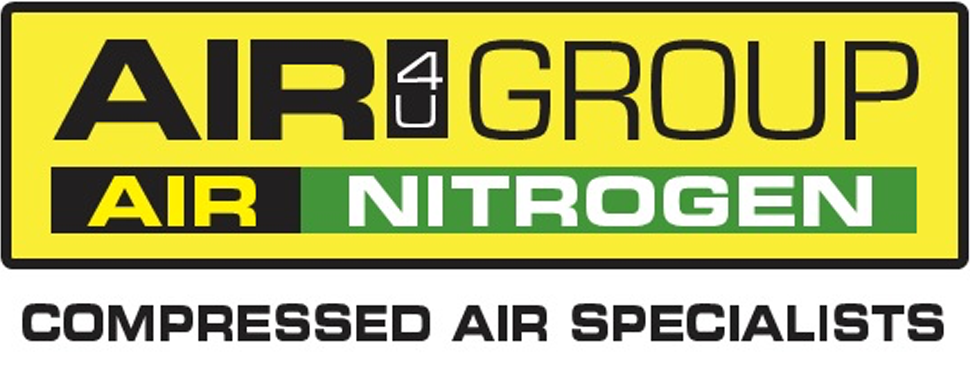Why you should change the air filter on your compressor?
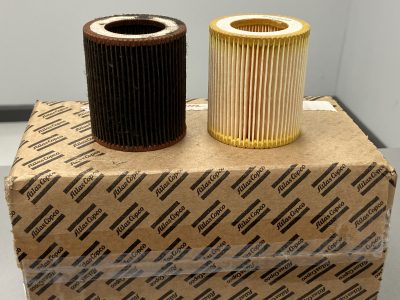
You should change the air filter on your compressor if your air compressor is running hot, consuming excess power or the output pressure is down. The first thing you should do is check for leaks in your airline. If everything looks good on the delivery side, it’s worth checking your air compressor filter.
One of the more common problems with air compressors is a clogged filter. Clogged filters can occur when moisture or other types of debris accumulate inside the filter. Is your compressor in a dirty environment? If so, it can easily suck in contaminants. Our photos shows a nice clean filter on the right and a used, dirty filter on the left. A big difference, isn't there!
The filter serves an important purpose, removing impurities to give you a clean air supply, but over time those impurities inevitably build up to block the fine holes in the filter.
Ideally, you should check your filter frequently – as often as once a month – as it’s easier to remove lighter accumulations of dirt with a simple tap of the filter or blowing compressed air through it. Many filters are easily accessible within the casing, which makes them easy to clean.
When your filter is severely clogged, for example if you have not checked or cleaned it for many months, it may be easier and more effective to replace it rather than clean it.
How to keep air compressor filters clean?
You can get more life out of your air compressor filters by keeping them clean for longer, and by cleaning them more regularly. Some simple measures to do this include:
- Try to keep the area around the compressor free from dust.
- Make sure you follow the manufacturer’s instructions regarding ventilation space around the compressor.
- Identify the air intake vents and keep them clean.
- Be aware that your air compressor may have multiple filters, including air filters and oil filters, so check each of these and make sure you know how to clean them and when to replace them
How often should I replace my air compressor filters?
This is the big question. Replacing air compressor filters can pay for itself in improved efficiency and reduced power consumption.
If you use your air compressors continually in an industrial setting, it may be sensible to change your filters at regular intervals – for example, twice a year.
On compressors you use less often or if the filter does not look dirty, you may be able to give it a quick clean and put it back without significant loss of efficiency.
Ultimately it’s about keeping your air compressor in good working order and reducing your overall running costs – so a relatively small investment in a new clean filter could quickly recoup its costs.
If you need any further help or advice, please follow the link to send us an email at service@air4ultd.co.uk
Welcome to our new apprentice!
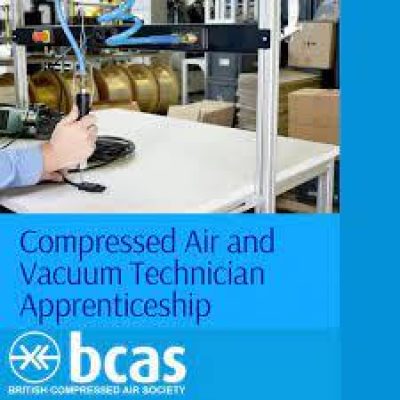
We can confirm that we are no longer looking for an apprentice to join us. Our new Apprentice, Flynn, started with us on Monday 5th September.
He will be doing a 3 year BCAS (British Compressed Air Society) ‘Compressed Air and Vacuum Technician (CAVT) Apprenticeship’ with Semester: L&D', together with lots of hands on training with our Engineers.
We are looking forward to working with Flynn while he completes his apprenticeship.
Are you paying too much?

Are you paying too much? Here are some tips to help you reduce your running costs by making your compressor installation more energy efficient.
Eliminate air leaks.
Probably the biggest source of wasted energy in new and old compressed air systems is air leaks. Often, they occur in places that are difficult to see or inspect. Did you know that by fixing small leaks/hole could save you £1,000’s per year on your energy bill? Bet you would enjoy those savings? Air4UGroup can assist by carrying out onsite surveys to help you better understand the operational savings you could achieve.
Reduce system pressure.
For most compressor systems if you can reduce pressure by just 1 bar (14.5 psi) this would equate to a 6% saving in electricity consumption. On a lot of compressors this can be achieved very easily by some simple changes in the control parameters, the operating mode and pressure settings of the compressor. They can be adjusted until the optimal cut in pressure is reached, without affecting pressure.
Ensure the correct size of compressor is installed.
Choosing the wrong size air compressor for your facility can lead to problems with production, as well as increased costs due to wasted energy. It could also lead to increased maintenance requirements and poor air quality. When choosing the right type of compressor, you should ask yourself these questions:
- How much air does my factory/workshop need?
- What is the minimum pressure needed at point of use?
- Do you need clean/dry air to a specific quality?
- Are there fluctuations in flow demand? (e.g., less machines running overnight)
- Do you have any expansion plans for your factory in the future?
If you have no idea of the answers to some of these questions, Air4u Group can carry out a Compressed Air Audit which is an effective way to identify your current energy use and to assess your compressed air needs. This is carried out by attaching a Data Logger to the compressor for a minimum of 7-14 days. It observes and records any usage over that period.
Results will provide information on your compressed air usage. Also, they can identify busy and quieter periods and if there are any leaks in the system.
This can help to provide information on the overall efficiency of the compressor. As a result of the logging, we can get a more accurate understanding how your system is set up.
Designing an efficient compressed air system.
When looking to design your compressed air system it is important to consider more than just the air that you need at point of use. You should consider what air treatment package will be needed to achieve the air quality that you may need. Typical system components can include, refrigerant and desiccant dryers, particulate filters, pipework, condensate management and more. Careful attention in the selection of these components can help to minimise pressure drops while still maintaining the required pressure and air quality. E.g. do you really need desiccant dry air (typically, 15% of the rated flow capacity of the desiccant dryer is consumed as purge air)?
To assist you with your compressed air system design, Air4U are happy to help you.
Heat generated can be turned into useful energy with heat recovery.
Heat Recovery offers significant savings and allows you to harness waste heat from air compressors. Without heat recovery solutions, the heat is lost into the atmosphere. The amount of electrical energy that can be recovered depends on the type and size of the compressor, but total system heat recovery could be up to 94% of the energy used to run your compressor. Even some simple ductwork can be used to direct the air into your factory to help warm the building or to vent the hot air outside in the summer.
If you have any questions or are looking for advice about the best compressed air solution for your operation to achieve the lowest total lifecycle costs. Air4U offers a range of products, including rotary screw compressors, nitrogen generators and air treatment packages supported by experienced and knowledgeable engineers.
Please do not hesitate to follow the link to send us an email at sales@air4ultd.co.uk
Increase in Hire Charges
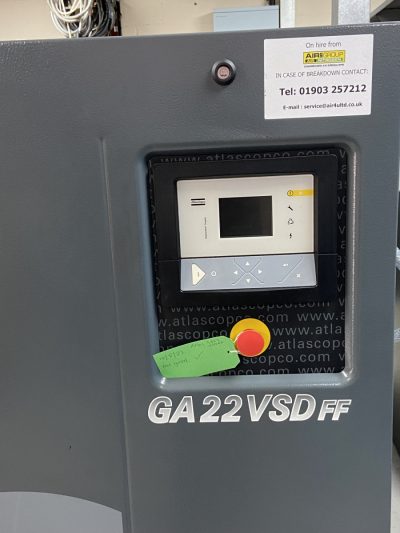
Air4u Limited have had to make the hard decision to increase the cost of the charges for our fleet of hire machines.
In our previous Blog about Looking for Short or Long-Term Compressed Air Equipment Hire, we spoke about the benefits of hiring an Air Compressor. It can help with short-term breakdown, long-term contract hire, planned contingencies or unexpected emergencies.
Also, we advised that we stock a range of fixed speed and variable speed electric Compressors, Dryers, Filters and Receivers at our premises in Arundel, West Sussex.
For more information, please follow the link to our website https://www.air4ultd.co.uk/looking-for-short-or-long-term-compressed-air-equipment-hire/
The new prices are set out below, these are subject to availability.
| Size in kw | FAD in CFM | Rental Cost Per Week £ |
| 1kw – 7kw | 4 – 45 cfm | £150.00 |
| 11kw | 60 cfm | £200.00 |
| 15kw | 80 cfm | £200.00 |
| 18kw | 100 cfm | £200.00 |
| 22kw | 120 cfm | £200.00 |
| 30kw | 160 cfm | £220.00 |
Delivery, Collection & Installation EXTRA |
||
If you would like more information or wish to find out how we can help you, please follow this link to send us an email: info@air4ultd.co.uk and our team will be happy to help with any questions you may have.
Air4u Limited are a member of the Chichester Chamber of Commerce and Industry

Did you know that Air4u Limited are a member of the Chichester Chamber of Commerce & Industry?
Chichester Chamber of Commerce & Industry is a successful networking organisation that offers support to the businesses and industries of Chichester and the surrounding areas. It encourages measures to improve the social and economic conditions of the local area and liaises with representatives about business interests affecting the city and its district.
It helps us to keep up to date with any commercial and local areas issues that may affect our business. They provide help and information with finding grants, funding, and business support initiatives. We can access training and workshops. Also, they have a variety of webinars and informal knowledge share sessions. Finally, they provide a range of networking and business development opportunities at meetings and events.
Air4u Limited decided that becoming a member of the Chichester Chamber of Commerce & Industry was an excellent way of keeping up to date with all the latest Business News and Updates and what is happening in our local area. There is also an online Forum, where businesses can ask for and receive advice.
During Covid-19, the Chichester Chamber of Commerce & Industry website had lots of information to help with furloughing staff and what financial help was available.
Have a look at their website at https://www.chichestercci.org.uk/
Will a variable speed air compressor save me money?
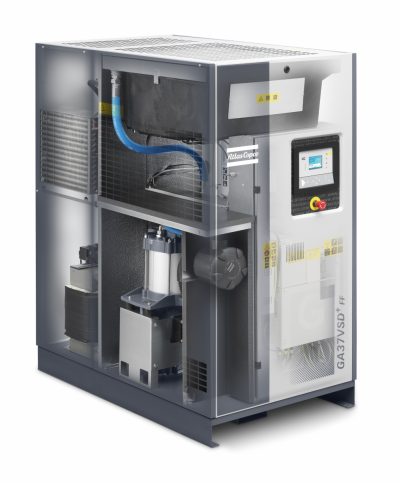
Will a variable speed air compressor save me money? The short answer is possibly but it all depends on a number of factors.
There are two main types of industrial rotary screw compressors available on the market.
- Fixed Speed
- VSD (stands for variable speed drive.)
Which compressor is better for you in terms of energy efficiency? Air4u Group offers both VSD and fixed speed compressors, because each type offers advantages in specific circumstances.
Fixed speed compressors
Traditional air compressors are fixed speed, meaning they run at a constant and consistent speed. This produces a fixed amount of compressed air per minute. If your application requires a constant speed at all times, then a fixed-speed compressor will often get the job done. Once you switch it on, it eithers producing 100% of its capacity, or none. When air is required, it runs at full capacity, when demand for compressed air drops, it stops making compressed air altogether although the motor keeps on running.
This means that it is either using maximum energy to create compressed air, or slightly less than half of the energy to keep the motor running when it is not making compressed air. For instance, an 11 kW compressor will use 11 kW of energy when running at full capacity (known as ‘on load’) and approximately 4.5 kW of energy when running at no capacity (known as ‘off load’).
Therefore, a fixed speed compressor is energy efficient when it is supplying compressed air for a demand that is constant and matched closely to the maximum capacity of the compressor. Running this kind of compressor when demand is low results in wasted energy because the motor is using energy but there is no compressed air being made.
VSD compressors
A VSD compressor uses inverter technology that automatically adjusts the compressor’s motor speed to the compressed air demand in real-time. In other words, it only gives you as much compressed air as you need at any given time. That doesn’t make a lot of difference if you need the same amount of compressed air all the time. If, however, your compressed air demand fluctuates, then you can achieve major energy savings with this environmental technology, a variable speed drive.
A VSD compressor is a smart choice when demand for air varies by process, time of day, shift or time of the year. When demand fluctuates, a VSD compressor that varies its speed is much more energy efficient than a fixed-speed compressor that can only run flat out.
How do I know whether my compressed air demand fluctuates, or is relatively static? And would a VSD compressor save me money?
A detailed analysis can be carried out by installation of a data logger on the compressor. This monitors and records the energy used by the compressor over a period, for instance a week. The information is downloaded and presented in a report which provides a compressed air demand profile detailing the energy costs. Air4u Group are able to provide this service. For more information, please see our website https://www.air4ultd.co.uk/why-have-compressor-data-logging/
Other key factors to consider before upgrading your compressor:
Ensure the compressor you are considering is adequately sized – not too small but not too big either. You will want to consider the possibility of future growth so sometimes considering a compressor slightly bigger is a good idea. For more information, please see our website https://www.air4ultd.co.uk/how-do-i-know-what-size-compressor-i-need/
Ensure you have minimum compressed air leakage in your pipework. Leaks are the single most costly issue in a compressed air system. Money is literally disappearing into thin air in wasted energy, compressor running costs, service costs and wear and tear. Oure website has suggestions on how to find and fix a leak https://www.air4ultd.co.uk/find-and-fix-that-leak/
There are many makes of compressors on the market, however it’s worth investing into a quality product so that you only buy once.
Air4U Group pride ourselves on offering compressors that are extremely energy efficient and with a reputation for reliability and robust construction.
By investing a little extra in a more energy efficient and reliable compressor, you can save a significant amount of money in electrical running costs and reduced down time.
If you agree to a service plan with us for your new compressor, most quality compressor manufacturers will offer you an extended warranty and we can offer fixed price servicing for the length of the warranty. This means you can budget how much the maintenance will cost for the life of the service plan.
If you would more information or advice, please do not hesitate to follow the link to send us an email at sales@air4ultd.co.uk
Another year as a BCAS Member!
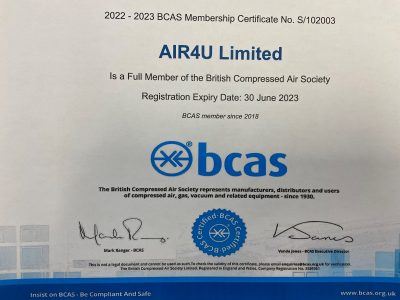
We are proud to be a BCAS Member for another year.
Air4u Limited are committed to providing the best possible advice and service to our customers.
Who are BCAS (British Compressed Air Society)?
In a world of constantly changing legislation and standards, BCAS plays a crucial role in driving progress in the compressed air industry.
Founded in 1930, the British Compressed Air Society is the only UK technical trade association open to manufacturers, distributors and end users of compressors, vacuum pumps, pneumatic tools and allied products.
In addition, BCAS plays a crucial role in upholding standards and advising its members about changing legislation and standards to ensure compliance and safety within the industry. It is also an active member of Euris to lobby on UK matters , Pneurop to lobby on European legislation, BSI and the International Organization for Standardization (ISO).
Crucially, BCAS is an independent source of advice and technical help to ensure that compressor equipment, its installation and maintenance is energy efficient, compliant and safe.
Reduce your Compressed Air Energy Consumption

The British Compressed Air Society (BCAS) has launched the 10% Taskforce, which is a call to UK businesses to take simple steps to reduce Compressed Air Energy Consumption by 10%. Bearing in mind the current price increases for electricity, any help and advice to help save Electricity costs is always very welcome!
BCAS states that generating compressed air could be as much as 30% of a site’s electricity bill. What can you do to help your Compressed Air System to save energy?
Here are some ideas:
Fix leaks
Reducing air leaks is the single most important energy saving you can make. An ongoing leak test and repair programme will save you money in the long run. For more information, please see our website https://www.air4ultd.co.uk/find-and-fix-that-leak/
Improve maintenance
Regular maintenance will ensure your equipment is reliable and works efficiently. You could consider using energy efficient options are bought when replacing equipment, whether it is something as simple as new filter to a new compressor unit. You may wish to consider an Annual Service Contract which will resolve loss of production, random breakdowns, and high maintenance costs. Our website https://www.air4ultd.co.uk/maintenance/ explains how we can help.
Reducing Pressure
You need enough pressure to provide sufficient force for your needs. If it is too high it can cause unnecessary wear, along with higher energy bills. Did you know that every one bar pressure reduction equals about 7% energy savings? Reducing pressure and switching off compressors when there is no demand for air can help reduce costs. A Data Logging Audit or Energy Audit would enable a Compressed Air Engineer to provide a bespoke solution for you. For more information, please see our website https://www.air4ultd.co.uk/pressure-and-capacity/
Recover and reuse heat
Did you know that 95% of the energy consumed by a Compressor is converted to heat and this could be wasted into the atmosphere? This could cause a Compressor to overheat if the space around it is not ventilated properly. The heat generated could be used to help heat your premises! Ductwork attached to the Compressor can be used to control the hot air expelled by it and directed away. It can be directed outside the building (which can help with overheating) or back into the premises to help with heating the building during the colder months. If you would like more information, please follow this link to send us an email: info@air4ultd.co.uk
Manage air downstream
Compressed air can contain unwanted substances, for example, contaminant particles, water and oil, as well as dust. With the right treatment, such as filters and dryers, your Compressed Air System can be protected from these contaminants. Our blog https://www.air4ultd.co.uk/why-is-it-compressed-air-quality-important/ explains this in greater detail.
Changing behaviours
Most of the above requires elements of maintenance or equipment/system upgrades. However, you can make substantial efficiency improvements by encouraging employees to use Compressed Air more safely and efficiently by introducing new processes and maintenance checks.
These ideas were taken from BCAS 10% Taskforce free download which can be found on https://taskforce10.bcas.org.uk/
Or you can follow this link to send us an email: info@air4ultd.co.uk and our team will be happy to help with any questions you may have.
Should I have a backup compressor?
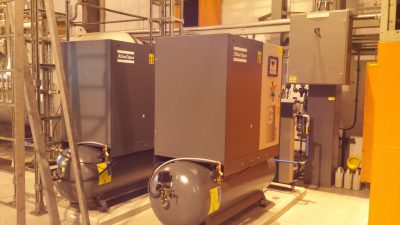
Do you need a backup compressor? Depending on your business requirements Backup Air Compressors Are Essential!
Compressors are used in many different kinds of businesses, from manufacturing to construction and more. What happens if something goes wrong with your main air compressor, though? With a backup air compressor, you can help reduce the amount of downtime if your main compressor breaks and also potentially increase output and productivity in busy times.
We think the answer can be simplified: if your business relies on compressed air to operate, production will cease, leading to a loss in output, possible production line losses, and costly downtime. Even with the fantastic back-up offered by Air4U group service engineers and a 24-hour breakdown service for contract customers, it could be a long time before a service engineer reaches you to complete the repair! Even with one of our loan/hire machines you can still get a period of downtime/production loss. Without a backup compressor available for immediate use, the time, money, and productivity lost in the interim between unexpected shutdown and being back up-and-running can be extremely detrimental to the business’ bottom line.
It’s unfortunate, but even the best equipment fails. This means that having a compressor system, complete with a backup compressor, is absolutely critical. Being proactive and purchasing one now, rather than down the road, is the smartest business decision – especially when you weigh the costs versus consequences of not having one.
An additional benefit? Having backup compressors means that maintenance can be done at virtually any point in time, rather than after hours or during the holidays or weekends when production isn’t occurring!
Backup air compressors are useful in those instances of which you cannot anticipate. It may be another additional expense, but it will save you the expenses in the future if or when the emergency calls for it.
The worry of the compressor sitting and doing nothing can also be eliminated by load sharing. Instead of letting your backup compressor sit unused and wondering if it will work correctly when you need it, keep it in action. Spread the workload over both machines with a timer to ensure even load sharing, and schedule maintenance for each while the other is in operation.
So, to summarize, the reasons that you need a backup air compressor are:
- To minimize any negative impact on production brought on by unexpected downtime.
- Schedule maintenance on your primary compressor at any point in time.
- Using both your primary air compressor and backup air compressor in your application through load sharing.
- Essentially, the costs of not investing in a backup air compressor far outweigh the cost of purchasing one, and you can take surprise shutdowns off the worry list.
Rest easy and avoid unplanned chaos – you can discuss investing in a backup compressor today.
Please follow the link to send us an email at sales@air4ultd.co.uk or call us on 01903 257117.
Compressed Air Safety - Is Compressed Air Dangerous?
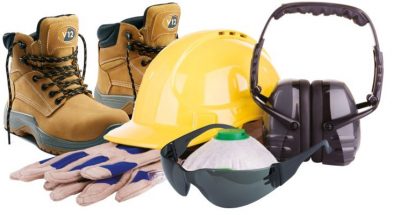
There are many ways in which compressed air can be dangerous. Every year, according to the British Compressed Air Society (BCAS), on average there are 150 dangerous occurrences in the UK. Of which, six result in fatal or severe injury.
Direct contact with compressed air can lead to serious medical conditions for example:
(a) it can enter body orifices such as the mouth, ears and anus, causing severe and often fatal injuries;
(b) at high pressure it can penetrate the skin;
(c) particles or oil carried in an air jet can damage the eyes;
(d) oil-coke deposits in a system can spontaneously ignite and cause an explosion;
(e) vessels containing compressed air, even at comparatively low pressure, can explode violently once their integrity is lost; and
(f) dirty or ‘wet’ air can lead to corrosion and blocked valves which may make the system unsafe.
Knowing the risks of pressurized air or gas is the first step towards ensuring job site and workplace safety. Below we list some but not all of the potential safety issues to be considered when using compressed air.
- Messing about- Never point a blowgun at yourself or another person! Absolutely no horseplay. It only takes 12 PSI to blow an eye out of its socket, and 40 PSI can blow out an ear drum from 4 inches away. Air moves faster than you do, don’t let a fatal accident happen by trying to be funny.
- Do you work in a dusty environment? Never use it to clean clothing or your hair! Don’t use it to “dust” yourself off. See the risks above.
- Know the system limitation and pressure restrictions! As an example, filling car tyres with air can result in an explosion. Pay close attention to the pressure ratings and limitations and always use a gauge to check tire pressure. Hoses and lines are rated for maximum operating pressure too. Check the limitations of equipment before use.
- Visually check the conditions of your hoses and airlines before use! Holes, tears, or damaged nozzles can lead to leaks or clogs. These issues can lead to turning the pressure up to an unsafe level to attempt to compensate. Avoid this at all costs. Make sure all equipment is working correctly before use.
- Wear the correct PPE! This includes everything from safety glasses w/ side shields, full-face shields, face masks, hearing protection, and sometimes even respiratory protection. Normal work clothing is not sufficient protection against pressurized air.
- If you must clean the workspace or equipment with compressed air, do not use air set above 30 PSI. 30 PSI is sufficient for removing dirt and debris, any higher can be a threat to workplace safety.
What are some of the simple things you can do to help reduce the associated risks?
- Fit pressure reducers to blowguns to ensure that you can’t go above 30PSI.
- Fit air fuses. Designed to protect machinery and personnel, an air fuse is a simple inline device installed in pneumatic systems that responds to issues such as a broken compressor air hose of a damaged pipe. An air fuse responds immediately by shutting off the air should the volume of air exceed a set value. This value is a factory pre-set and is to allow normal air consumption such as the use of air tools etc. If the pneumatic line is damaged the air consumption would rapidly increase causing the air fuse to shut down rapidly.
- It is recommended that worm drive clips are not used on flexible hoses. Replace them with crimped fittings such as O-Clips.
- Ensure you have a Written Scheme of Examination in place and that’s items are being regularly inspected. Compressors and associated equipment should be installed and maintained correctly to ensure safe operation. System energy audits play a leading role in identifying health and safety risks from the operation of below-standard installations.
Incorrectly specified equipment, air leaks, poorly sized and installed pipework with long runs, excessive bends and fittings can all pose a health and safety risk.
This is just a small blog on some of the problems/safety concerns that may arise with your system.
If you wish to find out any further information or need advice, please follow the link to send us an email at sales@air4ultd.co.uk
Also, why not check out our blog 'What is a Written Scheme of Examination'.
https://www.air4ultd.co.uk/what-is-a-written-scheme-of-examination/
